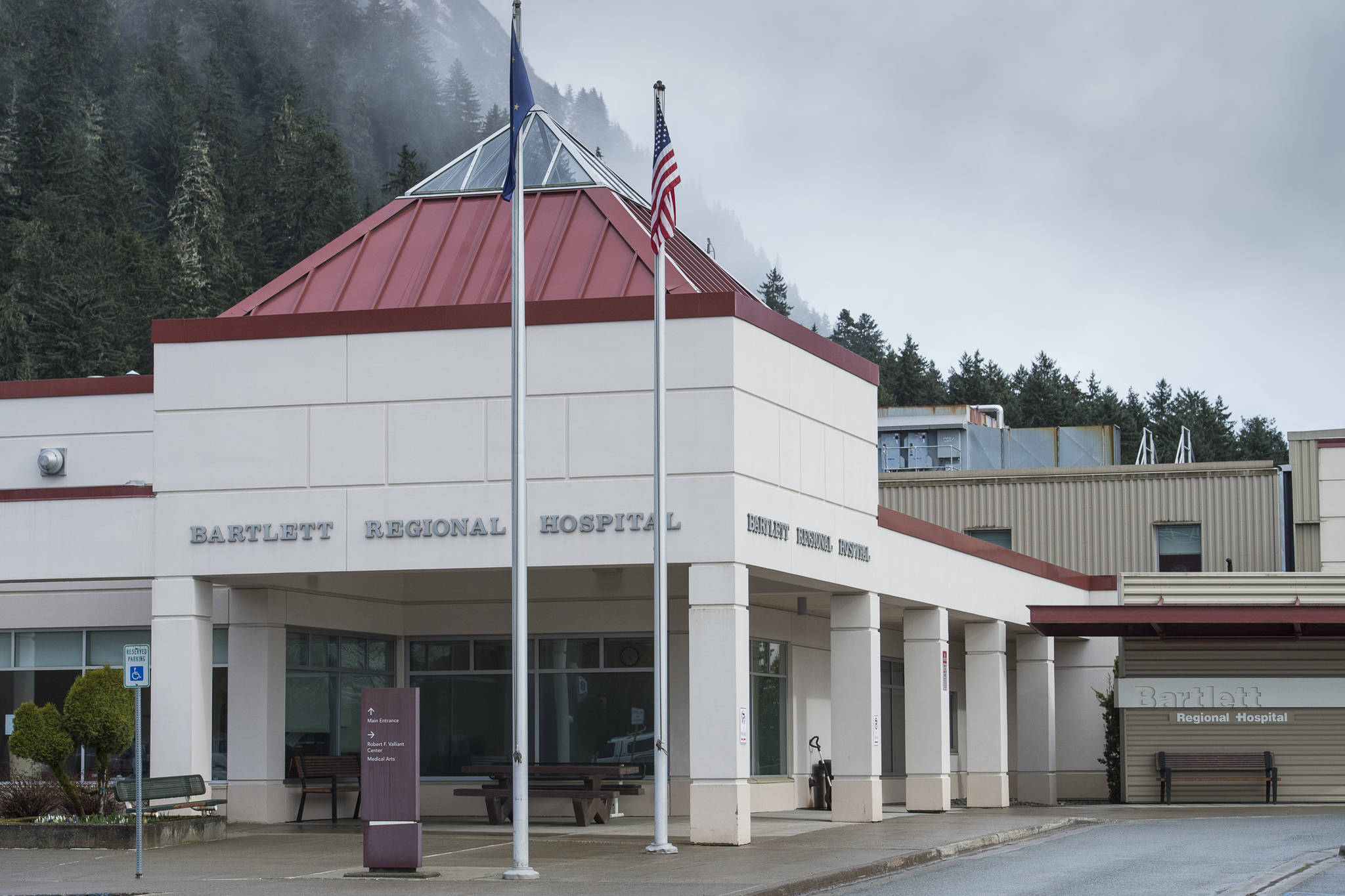State budget talks indicate Medicaid reimbursement is likely to decrease, but Bartlett Regional Hospital’s fiscal year 2020 budget is “business as usual.”
Hospital CEO Chuck Bill and CFO Kevin Benson presented the hospital’s budget to the City and Borough of Juneau Assembly Finance Committee Wednesday evening, and while potential lost revenue was addressed, it wasn’t a giant factor in the presentation.
There would be an estimated $2 million lost in Medicaid reimbursements based on current budget discussions, Bill and Benson said.
“Based on the day, that tends to be kind of a moving target,” Benson said of potential lost Medicaid reimbursement.
The presented budget for Bartlett Regional Hospital expected to be $107,124,060 in expenses and$108,023,800 in revenue. There would be a projected fund balance of $80,444,040.
In 2018, expenses totaled just over $98.77 million, revenue was about $102.78 million, and the fund balance was near $75.27 million.
Assembly member Wade Bryson questioned the fund balance total.
“Is it common practice for a municipal hospital to have a 75 percent fund balance?” Bryson asked. “Is that usual or are you guys just really good?”
[State economy is showing growth, but there’s a giant question mark ahead]
Bill said both, and said increasing the balance has been a goal for multiple years because of state funding uncertainty.
Assembly member Loren Jones, Finance Committee Chair, said instances in which the state has been late in making Medicaid payments are times a healthy fund balance has been important.
The hospital’s budget omitted some things that could have a net positive impact on the hospital’s financial picture, Benson said.
Things not factored into the presented budget included pursuit of a swing bed program which Benson said could be a net positive of $800,000; and expansion of 340B drug savings to retail pharmacies, which could have a positive benefit of $1 million.
Swing bed programs are similar to assisted living programs and provide skilled care in a hospital setting, and 340B is a federal program designed to allow hospitals with substantial medicaid population to buy drugs for less than full price.
The potential transfer of the hospital’s sleep off program, which provides transportation and a place to sleep for inebriated people was also excluded from the budget.
Transferring the program to Capital City Fire/Rescue has been discussed.
The change would eliminate $800,000 of alcohol tax revenue for the hospital, but Benson said would also remove at least $900,000 of expense.
“The transfer of the program would not have an adverse effect on the budget for 2020,” he said.
Other presentations
Both the Youth Activities Board and City and Borough of Juneau School District made presentations Wednesday evening, too.
The Youth Activity Board allocates youth activity grant money among community nonprofits. The city manager’s budget recommends allocating $332,500 of the 1 percent sales tax for grants in fiscal year 2020.
That’s the same as was recommended last year, but is about $18,000 less than the board used to get, said Chair Tom Rutecki, who had emailed Assembly members asking them to consider additional funding.
“I figured what the heck, might as well try,” Rutecki said. “At one point, we got $350K. In 2015, we got reduced to the current level. So I think we are going to try for the next budget cycle see if we can get that money back.”
He estimated 11,000 Juneau youths benefit in some form from the program, which will seek to provide some level of funding to 27 programs in Fiscal year 2020.
City finance director Bob Bartholomew said the reduction was part of a two-year push to cut city expenses amid flat revenues and correcting oil prices.
That $18,000 could be added sooner than fiscal year 2021.
Assembly member Maria Gladziszewski made a motion toward the end of the meeting to add the $18,000 to the committee’s pending list, and there were no objections.
That means the item will be further discussed.
The school district’s presentation focused on outside of the cap funding.
The total funding request was $1,676,500 total — $50,000 for food service, $50,000 for transportation, $95,000 for community schools, $1,079,300 for high school activities, $102,200 for middle school activities, $300,000 for Kinder Ready classrooms.
Everything except for the Kinder Ready funding was recommended after a motion by Mayor Beth Weldon. The child care funding was moved to the committee’s pending list for further discussion, since assembly members anticipated talking about child care in a wider scope later on.
Jones said he anticipated the matter coming up May 8 at the committee’s next meeting.
“That may be the only thing we try to deal with on the eighth,” Jones said.
Ordinances and hearings
Prior to the Finance Committee meeting, there was a special Assembly meeting that allowed for a handful of charter-required public hearings for ordinances and a resolution related to the budget.
All were referred back to the Finance Committee for further review, and there was no public comment on any of the ordinances, which included ordinances establishing a total mill levy of 10.56; an ordinance appropriating $377,166,800 for the CBJ operating budget excluding the school district and appropriating funds from the treasury for a district operating budget of $87,471,500. That district’s operating budget is up $229,700 from the previous fiscal year, said City Manager Rorie Watt.
[City holds first meeting on budget]
The local funding for that consists of: $26,497,800 for general operations, and $1,676,500 for programs and activities outside of the state funding cap for a net funding increase of $82,500.
A resolution establishing the capital improvement priorities was also given a hearing and referred back to the Finance Committee.
• Contact reporter Ben Hohenstatt at (907)523-2243 or bhohenstatt@juneauempire.com.

